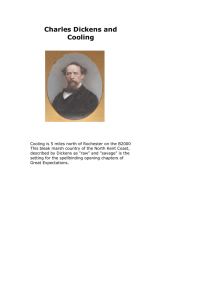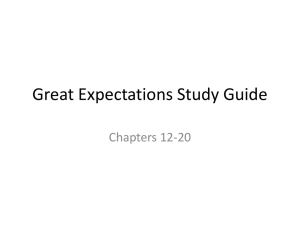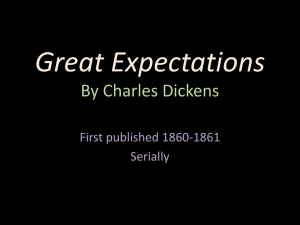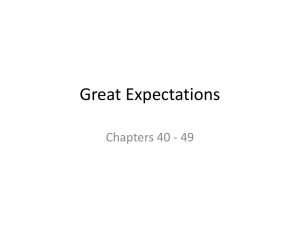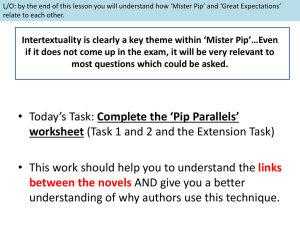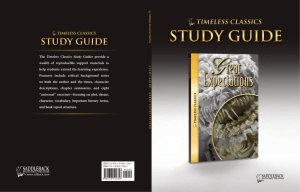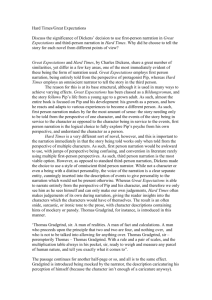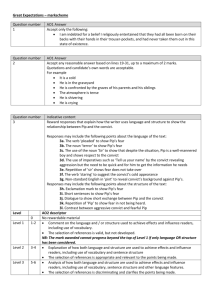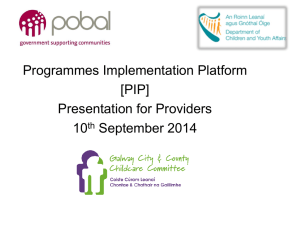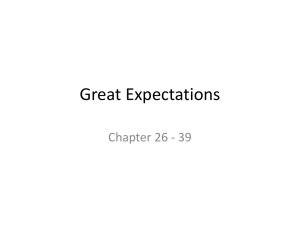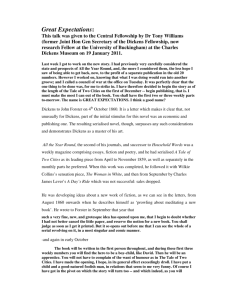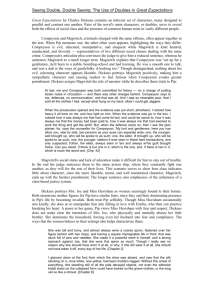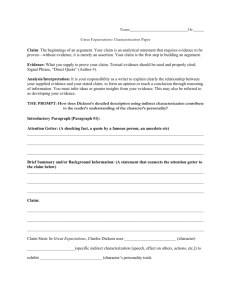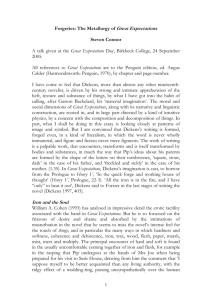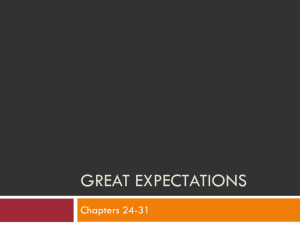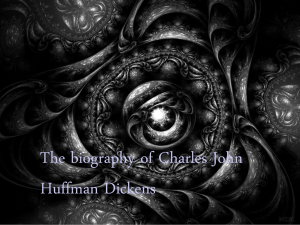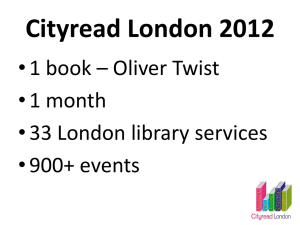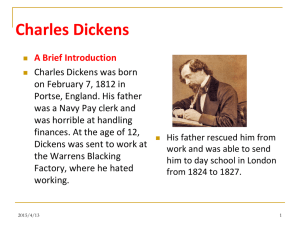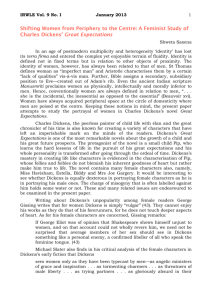Review 1 - My MVNU
advertisement
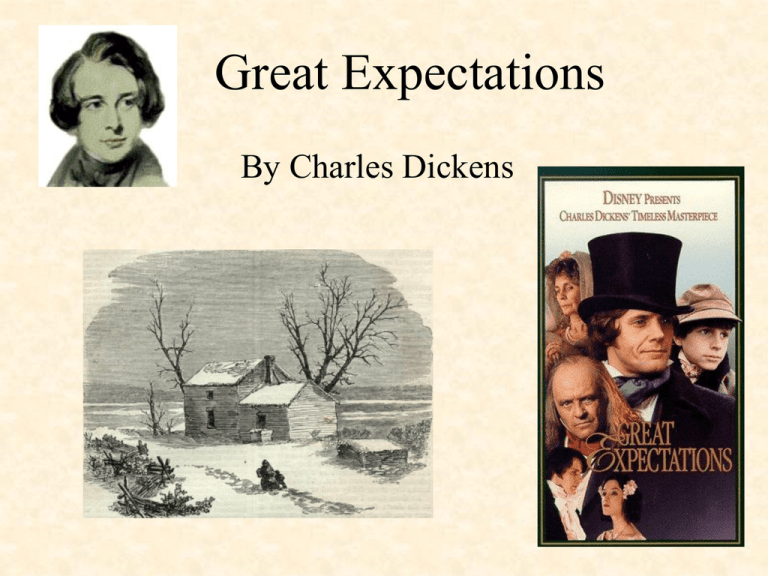
Great Expectations By Charles Dickens Charles Dickens February 7, 1812 – June 9, 1870 • Dickens was born in Portsmouth, Hampshire to John Dickens, a naval pay clerk, and his wife Elizabeth Dickens. • When he was five, the family moved to Chatham, Kent. • When he was ten, the family relocated to Camden Town in London. • His early years were an idyllic time. He thought himself then as a "very small and not-over-particularlytaken-care-of boy". • He talked later in life of his extremely strong memories of childhood and his continuing photographic memory of people and events that helped bring his fiction to life. • His family was moderately well-off, and he received some education at a private school but all that changed when his father, after spending too much money entertaining and retaining his social position, was imprisoned for debt. • At the age of twelve, Dickens was deemed old enough to work and began working for ten hours a day in Warren's boot-blacking factory, located near the present Charing Cross railway station. • He spent his time pasting labels on the jars of thick polish and earned six shillings a week. With this money, he had to pay for his lodging and help to support his family, which was incarcerated in the nearby Marshalsea debtors' prison. • Dickens began work as a law clerk, a junior office position with potential to become a lawyer. • He did not like the law as a profession and after a short time as a court stenographer he became a journalist, reporting parliamentary debate and traveling Britain by stagecoach to cover election campaigns. • His journalism formed his first collection of pieces Sketches by Boz and he continued to contribute to and edit journals for much of his life. • In his early twenties he made a name for himself with his first novel, The Pickwick Papers. Great Expectations • Dickens wrote and published Great Expectations in 1860-1861, and though the novel looks back to an earlier time (1812-1840), the period of composition itself is noteworthy. • Great Expectations looks back upon a period of pre-Victorian development that had become, by 1860, thoroughly historical. However, as a Victorian novel, Great Expectations is itself the product of a dynamic moment in history. Themes of Great Expectations • Ambition and SelfImprovement • Social Class • Crime, Guilt, and Innocence Characters From Great Expectations They keep on Coming Back Pip • Hero and Narrator • Readers follow this character from childhood to young adulthood. • Bildungsroman – novel of development • The question of evil: cultural or just naturally vicious. • Vulnerable from the beginning • Critics believe strongly autobiographical The Convict • Terrifies Pip, one of the worst of his culture. Despised by “good people.” • He is a strange combination of horror for Pip as well as pity. • Reminds Pip of a starving dog. Joe Gargery • Best of friends as ever we were. . . What Larks!” • .the closest • His brother-in-law Joe is thing to a father Pip has—but he is viewed by Pip more as a Peer than an authority. • “It is a terrible thing to be ashamed of home.” Mrs. Joe • Pip’s first wound—home is not a place of love but of frustration and discontent. • The terrible truth that abused children often become what they hated and dreaded. Other Characters Introduced Mr. Pumblechook, After Mr. Wopsle had said grace, my sister said to me, "Do you hear that? Be grateful." "Especially," said Mr. Pumblechook, "to them which brought you up by hand." Mrs. Hubble asked, "Why is it that the young are never grateful?" which Mr. Hubble solved by answering, "Naturally wicious." Joe spooned into my plate, at this point, about half a pint of gravy. Analysis of Chapters Chapter One • Dickens begins the novel with a child coming to a new understanding of himself. • Before he comes to that moment, however, the narrator describes how Pip begins life making assumptions about himself which while childishly charming are also quite clearly wrong. • This idea of faulty perceptions will be important throughout this novel. • The child's perspective and its connection to the early formation of self. This is what one friend calls a "satari" moment or an epiphany--a time when a new truth is revealed to the speaker. • In Pip's case, this truth is that he is, in fact, a very small person in a very large and frightening world. It is Pip's very poor luck that he should be also be standing close to a starving convict. . • The church “go head over heels before me.” The turning of Pip is of course a wonderful depiction of a child's perspective but also an indication of what indeed is beginning to happen to Pip. • His world is being turned upside down. Meanwhile, the turned over church and the tilting of poor Pip by the convict are realistic in their depiction of trauma and danger, but they are also fine examples of Dickens' humor Chapter two • "brought up by hand." A pun upon the phrase being "brought up by hand." Although we quickly realize it applies in Pip’s mind to the violence of her nature, the phrase actually means that a baby received milk "by hand" or by a bottle or spoon rather than from his or her mother's breasts. • Of course the lack of mother’s milk is also a reminder of the lack of love in Pip’s life. “Me a black smith’s wife” • One of issue raised in this that “Mrs. Joe” is socially unquiet. She married Joe because she needed a husband socially but she considers his life and career below her own station. • Note that she fawns of Uncle Pumblechook because he drives a cart—ironically this pompous windbag is actually related to Joe not her. • A picture of a dysfunctional marriage with an aggressive woman. Mrs. Joe is a classic example of a Shrew, a type of character we will meet in Shakespeare's "Taming of the Shrew." • Hercules in strength and also in weakness. Hercules was very unlucky in his choice of wives. In fact his final death was caused by the trickery of a centaur and a jealous wife. • Joe as a child?
